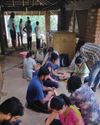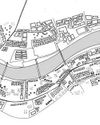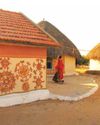Suchitra Deep spoke to Kazuyo Sejima about SANAA’s work and also her own journey as a woman in the profession. Kazuyo Sejima is associated with SANAA, the acclaimed Tokyo based practice where Sejima is a partner with Ryue Nishizawa. They were awarded the Pritzker prize in 2010, when they received international identity due to this notable achievement.

Kazuyo Sejima was in Bangalore on the invitation of MASA (Malnad Architecture School Alumni) to talk about her work at SANAA, the acclaimed Tokyo based practice where Sejima is a partner with Ryue Nishizawa. Although SANAA had been steadily making inroads within their country, they became internationally known when they were awarded the Pritzker prize in 2010. The Pritzker sometimes referred to as the Nobel Prize for architecture, has been awarded to just one woman before Sejima since its inception when Zaha Hadid won it in 2004. Architecture is a notoriously male dominated field, and the higher one climbs, the fewer the number of women one finds. Perhaps this is one reason that most awards in architecture seem to go to men. Given that, for Sejima to ‘make it’ in architecture, and so impressively, is not a small achievement.
SANAA (acronym for Sejima and Nishizawa Associates) was founded in 1995 when Sejima invited Nishizawa to become a partner in her firm. Since then they have worked on many projects both inside Japan and increasingly now, in other parts of the world. The firm is unique in the manner that they operate as a practice. Alongside their combined work in SANAA, both Sejima and Nishizawa also work independently on their own commissions within the office, and these individual projects operate on very different scales.
Sejima has designed houses on plots less than a thousand square feet in size, while a project like the River building at Grace Farms has 80 acres to spread out on. This diversity brings richness to their cerebration and an attitude of openness to work outside the envelope.
Denne historien er fra November 2016-utgaven av Indian Architect & Builder.
Start din 7-dagers gratis prøveperiode på Magzter GOLD for å få tilgang til tusenvis av utvalgte premiumhistorier og 9000+ magasiner og aviser.
Allerede abonnent ? Logg på
Denne historien er fra November 2016-utgaven av Indian Architect & Builder.
Start din 7-dagers gratis prøveperiode på Magzter GOLD for å få tilgang til tusenvis av utvalgte premiumhistorier og 9000+ magasiner og aviser.
Allerede abonnent? Logg på

Interlacing Perspectives
‘Meraki-2019’ A visionary Seminar series presented by Dr.Baliram Hiray College of Architecture, Bandra(East), Mumbai.

Facilitating A Community Through Architectural Practice
The humble, self-designed, self-built and organically planned home built by the majority of the world population rarely gets appreciated and critiqued as a viable lesson in architectural design.

The Art Of Solving Problems Creatively
The practice of architecture is perhaps incomplete without the complement of a variety of other arts.

Upcycling towards a playful tomorrow
Play is like the middle child, often forgotten, and always taking a back seat. For young kids, play can simply be running around, armwrestling with friends, building sandcastles on the beach, or singing popular music tracks in the shower.

Balancing The Poetics And Pragmatism Of Everyday Design
Humanity is faced with an oxymoronic crisis. The crisis involves the earth, the environment, impending looms of climate change, deforestation, loss of species, dwindling resources etc.

Just Give Me Some Space: Discussions And Beyond
Just Give Me Some Space (JGMSS) is Suha Riyaz Khopatkar’s debut book that paints a portrait of the dynamic life of an architecture student.

The Next In Vernacular Architecture
Architecture has become a capitalist.

Rethinking The Future: Architecture And Its Education
“I want to be like animals, the bird makes a nest in one or two days, the rat digs a hole in a night, but intelligent humans like us spend 30 years to have a house, that’s wrong.” - Jon Jandai

Uniting The Human-Scale With The City-Scale
London-based architect Usman Haque is famed for his interactive architectural systems, and for his exploration of newer, more effective ways of creating human engagement and interaction through his designs. Indian Architect & Builder caught up with him, to quiz him on a variety of topics such as his journey as an architect, his inspirations and philosophies, architects using the digital revolution to their advantage, and more!

Framing spaces
Almost every architect also doubles as a photographer or at least an enthusiast.